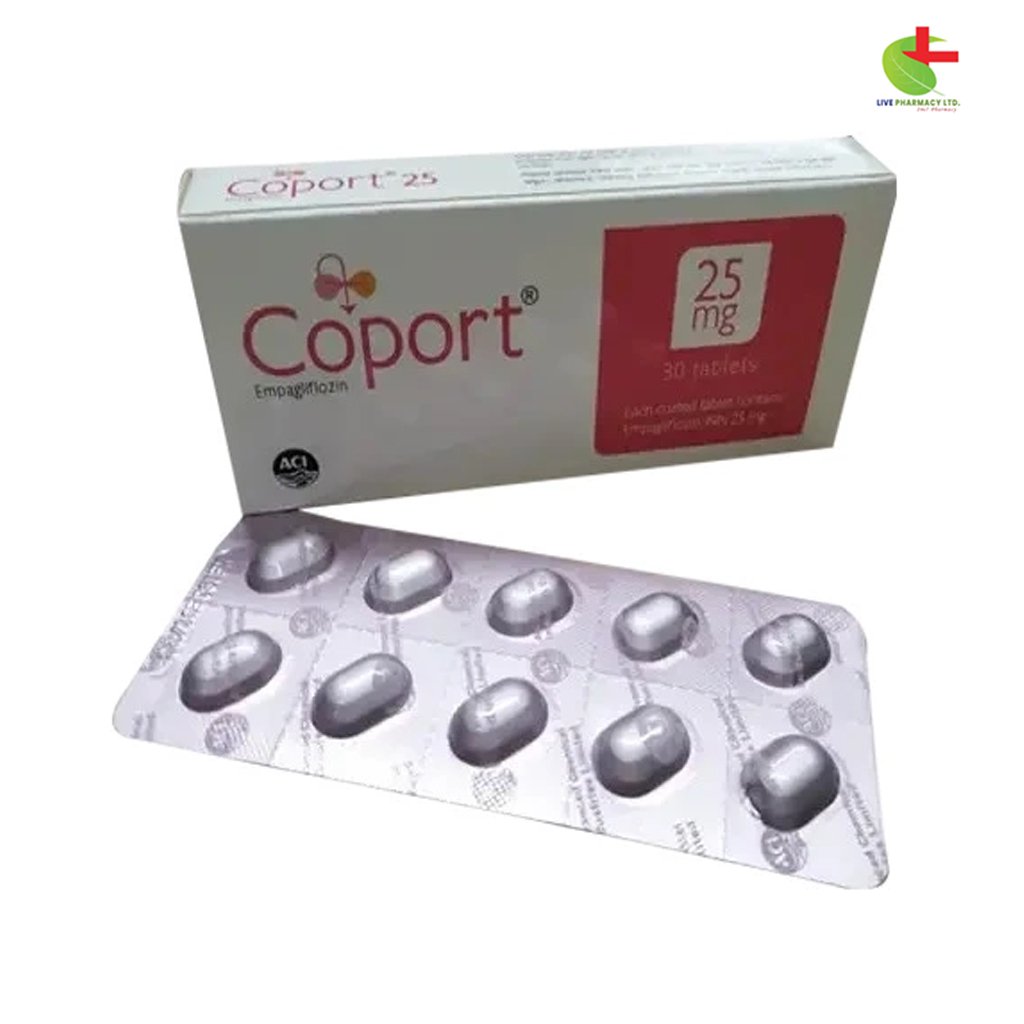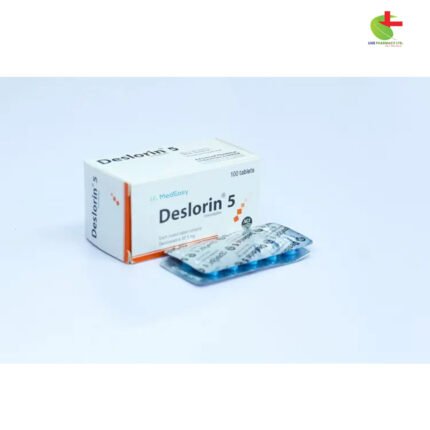Coport 25
450.00৳ Strip
- Coport (Empagliflozin) improves glycemic control in adults with type 2 diabetes.
- Reduces the risk of cardiovascular death in patients with established cardiovascular disease.
- Works by inhibiting the SGLT-2 protein, promoting glucose excretion and lowering blood glucose levels.
- Aids in weight loss and reduces blood pressure.
- Always follow a registered healthcare provider’s guidance for safe use.
 Brand
Brand
|
ACI Limited |
|---|---|
 Generics
Generics
|
Empagliflozin |
 Type
Type
|
Tablet |
Indications for Coport
Coport is prescribed for:
- Improving Glycemic Control in Type 2 Diabetes: As an adjunct to diet and exercise, Coport helps enhance glycemic control in adults diagnosed with type 2 diabetes mellitus.
- Reducing Cardiovascular Risk: Coport is also indicated to reduce the risk of cardiovascular death in adult patients with type 2 diabetes mellitus and a history of established cardiovascular disease.
Note: Always follow the advice of a registered healthcare provider when using this medication.
Pharmacology of Empagliflozin
Empagliflozin is a potent Sodium-Glucose Cotransporter-2 (SGLT-2) Inhibitor, which works by blocking the SGLT-2 proteins responsible for glucose reabsorption in the kidneys. This mechanism promotes increased glucose excretion through urine, effectively lowering blood glucose levels and reducing the renal threshold for glucose. Alongside its role in controlling hyperglycemia, Empagliflozin aids in weight loss and contributes to lower blood pressure.
Dosage & Administration
The usual recommended dosage of Empagliflozin is 10 mg once daily, taken in the morning with or without food. If the patient tolerates this dose, it can be increased to 25 mg daily. Before starting treatment, patients with volume depletion should correct this condition.
Note: Always consult a registered healthcare provider before starting or adjusting medication.
Drug Interactions
- Diuretics: When Coport is taken with diuretics, it may lead to increased urine volume.
- Insulin or Insulin Secretagogues: Coport can intensify the risk of hypoglycemia when used alongside insulin or insulin secretagogues.
- Urine Glucose Tests: Due to the glucuretic effect of SGLT2 inhibitors, urine glucose tests may yield false positive results. It’s better to use alternative methods for monitoring glycemic control.
- 1,5-anhydroglucitol (1,5-AG) Assay: Avoid using 1,5-AG assays to monitor glycemic control as they are unreliable in patients on SGLT2 inhibitors.
Contraindications
Empagliflozin should not be used by patients who have:
- A history of serious hypersensitivity reactions to Empagliflozin or its components.
- Severe renal impairment or end-stage renal disease.
- Patients requiring dialysis.
Common Side Effects
The most frequently reported side effects of Coport include:
- Urinary tract infections
- Female genital mycotic infections
- Dehydration
- Hypotension (low blood pressure)
- Fatigue
- Dizziness
- Increased thirst
Pregnancy & Lactation
- Pregnancy: There are insufficient well-controlled studies on Empagliflozin during pregnancy. It should only be used if the potential benefit outweighs the risks to the fetus.
- Lactation: It is not known whether Empagliflozin is excreted in breast milk. It is advised to avoid using this medication while breastfeeding.
Warnings & Precautions
- Renal Function Monitoring: Before starting treatment with Coport, it is crucial to assess kidney function. Coport should not be prescribed to patients with an eGFR below 45 ml/min/1.73 m². Regular monitoring of renal function is recommended throughout the treatment period.
- No Dose Adjustment for eGFR ≥45 ml/min/1.73 m².
Overdose Management
In the case of an overdose with Coport, standard supportive measures should be taken. These may include removing unabsorbed material from the gastrointestinal tract, monitoring the patient’s condition, and providing necessary supportive care. Hemodialysis has not been studied as a method of removing Coport from the body.
Therapeutic Classification
Coport belongs to the class of Sodium-Glucose Cotransporter-2 (SGLT2) Inhibitors, commonly used for managing type 2 diabetes and its associated risks.
Storage Conditions
Store Coport in a cool, dry place below 30°C, away from light and moisture. Keep it out of the reach of children.













Reviews
There are no reviews yet.